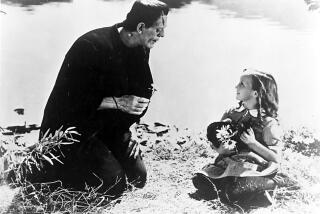A WOMB OF ONE’S OWN
- Share via
Regarding Louise DeSalvo’s “Defining the New Sexuality”; Review of “The Invention of Heterosexuality,” by Jonathan Ned Katz, and “The Apartheid of Sex,” by Martine Rothblatt (July 30):
Isn’t it remarkable that, in a review aimed at persuading us that there are no natural biological differences between the human sexes, Louise DeSalvo speaks wistfully of a future when one’s daughter’s husband “might very well be the partner gestating their baby in one of his body cavities?” I say “remarkable” because Nature plainly does not provide for such “possibilities,” as DeSalvo puts it, and in this fact of life lies the fatal flaw in the reviewer’s reasoning.
“The Book Review” has granted DeSalvo a forum for proselyztizing--for preaching her gospel of correctness to a far wider audience than the lone, misguided mother in Central Park who so witlessly counseled her daughter that she is, by nature, different than a boy. DeSalvo did not discharge her obligations as a reviewer with the same discretion that kept her from setting straight one errant mother. More’s the pity that the “Book Review” editor did not exercise a little editorial discretion by requiring of DeSalvo a more analytical and less hortatory piece.
As for the books themselves, Rothblatt’s thesis that there is “no real biological dividing line between women and men” fails to account for the womb in some persons and the lack of it in others. Even the uncritical DeSalvo is tripped by the fact that if what we loosely call a “man” is going to gestate a baby he will have to do it “in one of his body cavities.”
While Rothblatt presumably is employed in figuring out just which male body cavity can substitute most effectively for a womb, Katz is busied in peddling the tired contention that sexual relations between the sexes are “an organized practice of unequal power in which men dominate women and heterosexuals dominate homosexuals.” This timeworn shibboleth of the feminist movement confuses the appearance of power with the reality of it.
MICHAEL W. LODWICK, HUNTINGTON BEACH
****
I feel sorry for anyone who takes seriously the conclusion that Louise De Salvo comes to regarding the Katz/Rothblatt books on sexuality that she reviewed (July 30), i.e., her conclusion that these books “mark the possible emergence of a far more . . . tolerant future.”
Heterosexuality is the dominant form of sexual pair-bonding in all mammals, including humans. This is because of the reproductive advantage that such pair-bonding provides. Certainly there will always be occasional characterological mutations; after all, both physical and behavioral mutations are constantly occurring in all life forms. The historical question is whether a mutant form will propagate and become the dominant form within a species.
I believe that the environment will always favor the heterosexually pair-bonded, due to the reproductive advantages thereof. Despite the present status of greater power and respect currently gained by the homosexual sector, it is quite likely that its status will revert to that of shunned minority--though perhaps not as shunned as it has been in the past.
It should be further noted that even homosexually pair-bonded have a biological advantage over those who do not become pair-bonded at all. Such non-bonding types, society’s “ruggedly individualistic” users and exploiters, are at an advantage in a rapidly-growing economy; but as an economy stabilizes, the numerical advantage returns to those who love, whether heterosexually or homosexually.
LARRY SELK, LOS ANGELES
More to Read
Sign up for our Book Club newsletter
Get the latest news, events and more from the Los Angeles Times Book Club, and help us get L.A. reading and talking.
You may occasionally receive promotional content from the Los Angeles Times.










